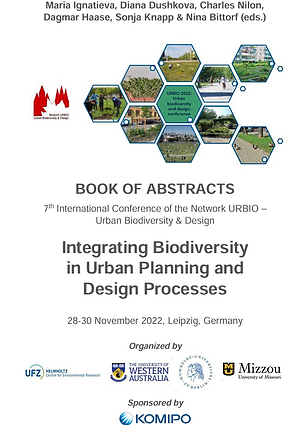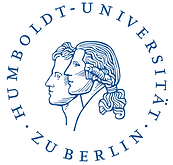URBIO (URban BIOdiversity and Design) is an open worldwide scientific network for education and research with the aim to promote the implementation of the UN Convention on Biological Diversity (CBD) in urban areas. Within the CBD programmes, URBIO is a scientific advisor for the Major Group "Local Authorities" and partner of the "Global Partnership on Local and Subnational Action for Biodiversity".
URBIO upcoming event: URBIO 2026 Conference "Education for urban biodiversity in design: practice-led research", 2-4 November 2026, Xi'an, China, link Deadline for abstract submission: May 01, 2026
Upcoming events of our partners: IFLA World Congress 2026 in Hong Kong, China (28–30 Oct) link
ESP 2026 Europe conference 2026 in Prague, Czechia (18-22 May) link
URBIO past event: URBIO Australasia conference "Urban Biodiversity and Design in Australasia: research, teaching, & collaboration opportunities East to West", Perth, 31 July-2 August 2025 https://urbio2025.tilda.ws/
URBIO 2025 Australasia Conference Book of abstracts can be found here
URBIO 2022 Conference
“Integrating Biodiversity in Urban Planning and Design Processes”
7th Conference of the URBIO network, 28-30 November 2022 in Leipzig/Germany

The 7th Conference of the International Network Urban Biodiversity and Design (URBIO) with the theme “Integrating Biodiversity in Urban Planning and Design Processes” took place on 28–30 Nov. 2022 at the Helmholtz Centre for Environmental Research – UFZ (conference location "Leipziger KUBUS"), Leipzig, in close cooperation with the Humboldt University of Berlin, the University of Western Australia and the University of Missouri. It was sponsored by KOMIPO (South Korea).
The conference acknowledged the growth in and understanding of the critical role of biodiversity in our cities and the necessity of its integration with practical applications such as planning and design. It highlighted the necessity of inter- and transdisciplinary collaboration and the importance of advanced research on urban biodiversity and its implementation to the planning, design and management of urban landscapes to promote integrated and multifunctional urban blue-green infrastructures for sustainable and resilient cities.
Topics:
-
biological, cultural, and social values of urban biodiversity (linked to ecosystem services)
-
urban flora and fauna, how to integrate nature into the urban neighbourhood and achieve the balance (human–nature interaction)
-
biodiversity-sensitive landscape design actions and other approaches/ best practices for better integration of biodiversity into the urban planning process and landscape architecture practice
-
nature-based solutions and their multiple co-benefits linked to biodiversity aspects
-
methodological approaches (e.g., a variety of participatory processes, research of urban biodiversity, practical implications of biodiversity in design and planning )
-
analysis, assessment, and evaluation of urban biodiversity linked to social and educational issues
-
urban conservation policies and their implementation in the development of sustainable cities: practical measures for restoring and maintaining biodiversity in urban areas
-
challenges and opportunities of urban biodiversity (e.g., ongoing climate change, the impact of COVID-19 pandemics, other societal challenges)
Deadline for abstract submission: 30 June 2022 -> now extended till 25 July 2022
Abstract acceptance notification: 15 August 2022
Abstracts will go through the peer-reviewed process with involvement of the URBIO Advisory Board and following publication of the book of abstracts and the conference programme, which will be available at the beginning of the conference. Please use the provided template (max. 350 words) for your submission.
The follow-up publications for the topic: SI in LAND and Urban Ecosystems Journals,
After the conference, the book of abstracts “Integrating Biodiversity in Urban Planning and Design Processes” based on papers from the conference participants will be published edited by Maria Ignatieva, Diana Dushkova, Charlie Nilon, et al.


Due to the current COVID-19 situation, the URBIO Conference 2020 is postponed to 2022.
We will keep updating about the due date for the abstract submission.
Thanks for your support of our URBIO Network in this challenging time!
URBIO Conference 2020 has been postponed to 2022
2020 Conference of URBIO-International Network
Urban Biodiversity and Design "Integrating Biodiversity in Urban Planning and Design Processes"
Humboldt University Berlin, 3-5 December 2020

The main conceptual theme of this conference is integrating biodiversity to the urban planning and design process.
Our growing cities, their future health and prosperity directly depends on the integrity of urban planners, architects and landscape architects. In most cases of urban ecology research, we are having deal with already created (designed) urban landscapes. The goal of this conference is to exchange conceptual ideas and results of theoretical and practical applications. How can urban ecologists make stronger connections to the planning of our cities and participating in architectural and landscape design processes at different scales: from Master plan to a park or neighbourhood, or urban forest or private garden? How urban ecologists can be more actively involved in the interdisciplinary teams in the city’s administration and work in close connections with citizens fulfilling goals of protection and reinforcing urban biodiversity? The conference will be running in three days (two days of presentation’s, workshop and discussions and a day of field trip to Berlin parks (demonstration of ecological design principles). Day three will be concluded by the final session. There will be also poster session and poster’s display.
Conference themes:
• Integration of biodiversity in urban planning and landscape design projects.
• Case studies of successful integration of design and ecology.
• What do we mean by biophilic cities, sustainable cities, ecological design, design with Nature and Nature Based Solutions? How these innovative concepts can be integrated into everyday urban planning and design practice?
• urban ecology participation in city’s master’s plans, neighbourhood projects and initiatives.
• Mechanism of increasing biodiversity in urban areas. Protection and conservation strategies.
Call for abstracts: Abstracts will go through the process of peer-reviewed process with involving URBIO Advisory Board and following publication of the book of abstract and the conference programme, which will be available at the beginning of the conference.
Conference outcomes: After the conference the academic book “Integrating Biodiversity in Urban Planning and Design Processes” based on papers from the conference participants will be published in respectful academic publishers such as Springer or Francis and Taylor.
.png)










